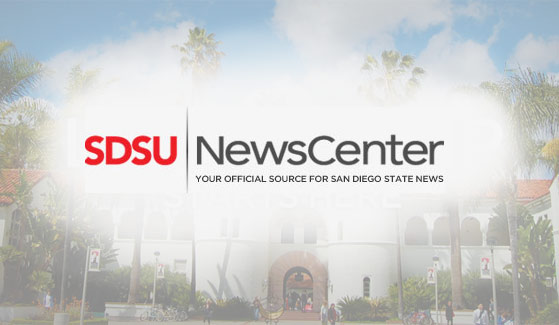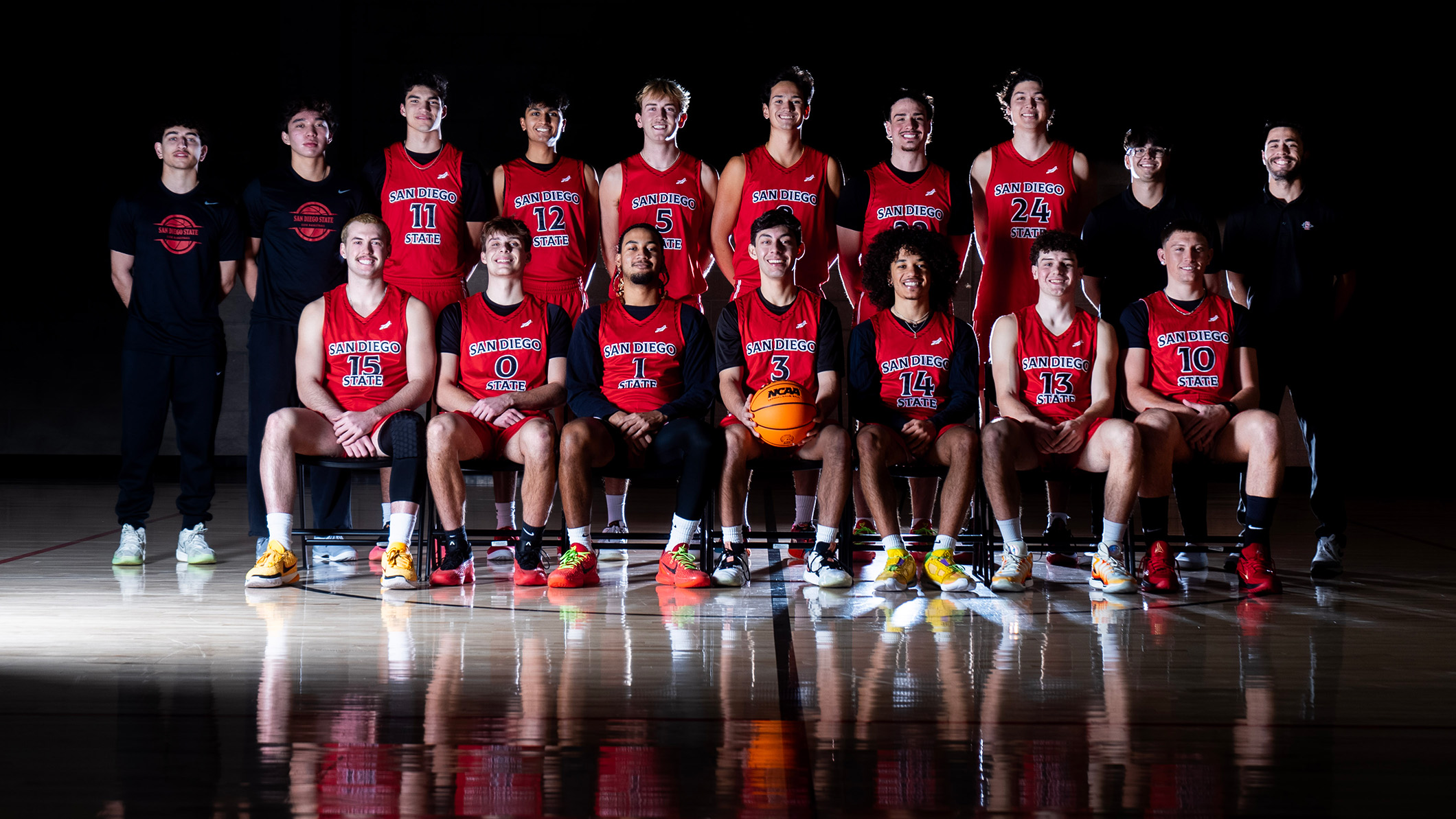SDSU's Entrepreneurship Ecosystem: Something for Every Student
Hundreds of students have received a head start on their ideas through classes, mentorship, incubators, internships and more.

Roscoe Thompson IV has recorded alongside a Grammy-nominated audio engineer and met face-to-face with top independent music publishers—all while a music student at San Diego State University.
How?
Thompson isn’t just a music student, he’s also an entrepreneurship student.
Thompson is taking a class affiliated with SDSU’s Music Entrepreneurship Program, which helps music students develop a working understanding of entrepreneurship that they can apply to their field.
It’s an unusual educational offering that has given Thompson a chance to learn from respected audio engineer James Linahon, who has more than 300 recording projects to his credit. “The program sets us up to work with leading experts in the field who teach us tricks of the trade that other students don’t receive,” Thompson said.
Thompson is one of hundreds of students who interact with SDSU’s entrepreneurship ecosystem each year through classes, mentorship programs, incubators, residential life communities, internships, pitch competitions, student groups, study abroad experiences and funding opportunities.
Many of them work with the university’s startup incubator, the Zahn Innovation Platform (ZIP) Launchpad, or the Lavin Entrepreneurship Center, which provides education and resources to students interested in entrepreneurship.
Not all students involved in SDSU’s entrepreneurship ecosystem plan to start a business. Some, like Thompson, learn how to apply an entrepreneurial mindset to their fields, and SDSU has programs for entrepreneurship in subjects from science to the arts.
Others use their talents to support classmates’ ventures and develop a love for product development or design during the process. The Aztec Cooperative Fund, for example, pays students to create elements like logos, packaging and websites for SDSU startups.
“It doesn't matter what you are studying at SDSU, you have the option to experience entrepreneurship,” said Cathy Pucher, ZIP Launchpad Director. “Whether you want a taste of entrepreneurship or a big bite, there is something for every student.”
Here are three more stories of students and alumni whose dreams and ideas were helped along by SDSU’s entrepreneurship ecosystem:
The Mentor
Less than a year after graduating, SDSU alumnus Eric Birkemeier is already mentoring a student entrepreneur at his alma mater.
While an undergraduate involved in the Lavin Center’s Entrepreneurship Program, Birkemeier received mentorship that proved critical to helping him build confidence in himself and grow his venture, skateboard headlight company ShredLights.
Now he wants to help other budding entrepreneurs develop that same confidence and business expertise.
“It’s really cool to show him that you don’t have to wait to start a business. You can start a business now,” Birkemeier said of his mentee.
Birkemeier and fellow SDSU alumnus Kyle Kitzmiller received more than $5,000 in non-equity seed funding from the university as they launchedShredLights, a task the duo squeezed in between full-time jobs and classes.
Now running ShredLights is their sole job. The company recently opened a location in San Diego.
Kitzmiller credits much of ShredLights’ success to SDSU’s entrepreneurship ecosystem, mentors and educators who gave him a crash course in the “entrepreneurial mindset.”
“I came in there as a mechanical engineer,” he explained. “I had learned a bunch of technical skills, but I really didn't know how to apply those to a business in a way that would be valuable. Being exposed again and again to other entrepreneurs, other student entrepreneurs, other mentors, that really ingrained in me the mindset that has allowed us to become an effective startup company.”
The Consultant
Jona Mae Tagaca was first drawn to the H.G. Fenton Idea Lab because of the machinery.
It was the ability to become a creative consultant while still a student that kept her there.
The lab, housed in the William E. Leonhard Entrepreneurship Center at SDSU’s Engineering and Interdisciplinary Sciences Complex, is ZIP Launchpad’s makerspace that helps student innovators refine their ideas and create prototypes of their proposed products.
“I saw they had this crazy lab with all these machines and I was like ‘Oh, wow. I really want to learn all of these things,’” explained Tagaca.
By interning at the Idea Lab, the mechanical engineering major has developed a mastery of 3D printers, laser cutters and a Computer Numerical Control (CNC) Mill, along with the complex computer programs that interact with the machines.
She uses these tools to help teams think creatively as they mock-up and develop their products—items like eco-friendly storage containers, headlights for skateboards, and wristwatches that include tracking technology.
One of Tagaca’s favorite things about working at the Idea Lab is helping entrepreneurs solve problems during the product development phase.
“I like working with teams. Product development has allowed me to merge entrepreneurship with my interest in engineering,” explained Tagaca, who considers herself a product development consultant after several semesters of working in the lab. “Who knows, in the future I might develop my own products for my own business ventures.”
The Cookie Innovators
Reyanne Mustafa spent five months baking nonstop in the small kitchen of her student apartment, perfecting her recipes. She used ingredients like beet pulp and coffee grounds to create the most delicious upcycled cookies possible.
The confections became the cornerstone product of Soul Much, the business she and Kristian Krugman began as undergraduates at SDSU. Soul Much takes discarded grain from local restaurants, grinds it into flour and uses that flour to bake healthy and environmentally friendly cookies.
The process of launching their business—from determining their business plan to finding the right flavors for their treats—had its ups and downs.
“Some days I felt like I was so close, and then others I felt like I took 20 steps backward,” Mustafa recalled.
Throughout those difficult early days, the ZIP Launchpad and the Lavin Center helped Soul Much build a lean business plan and make critical connections with mentors and fellow entrepreneurs who offered invaluable advice. “We got a crash course MBA in one semester,” said Krugman. SDSU infused the company with critical resources from the start, including more than $10,000 in non-equity funding to build the business and help its founders travel to pitch competitions, where they have won tens of thousands of dollars in additional funding. Soul Much used money from the Aztec Cooperative Fund to hire student designers who created their logo and marketing materials.
Mustafa and Krugman say SDSU’s entrepreneurship ecosystem was critical in making Soul Much into what it is today: a burgeoning cookie company with its own commercial bakery and a high-volume business in venues like the popular Ocean Beach farmers market.



